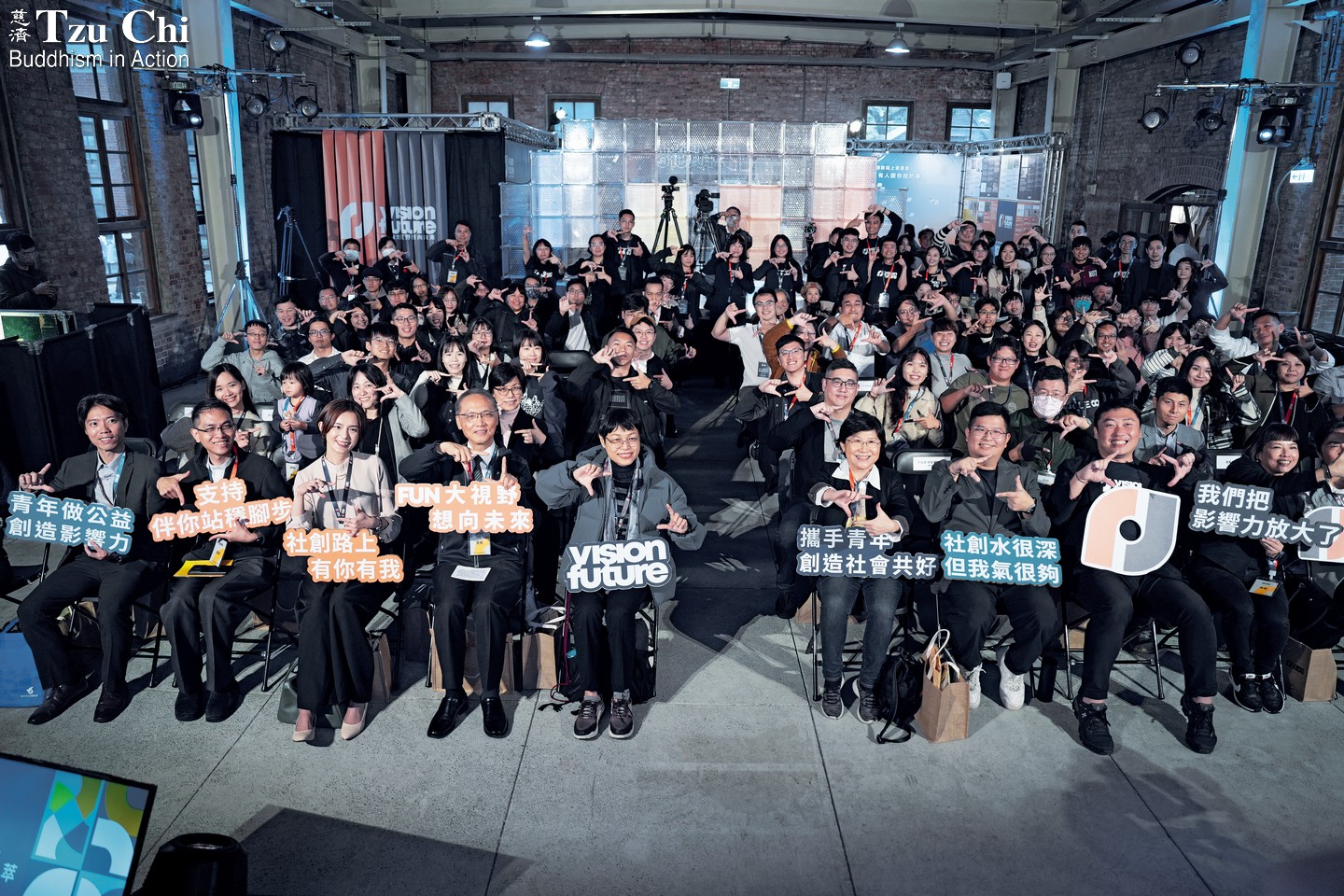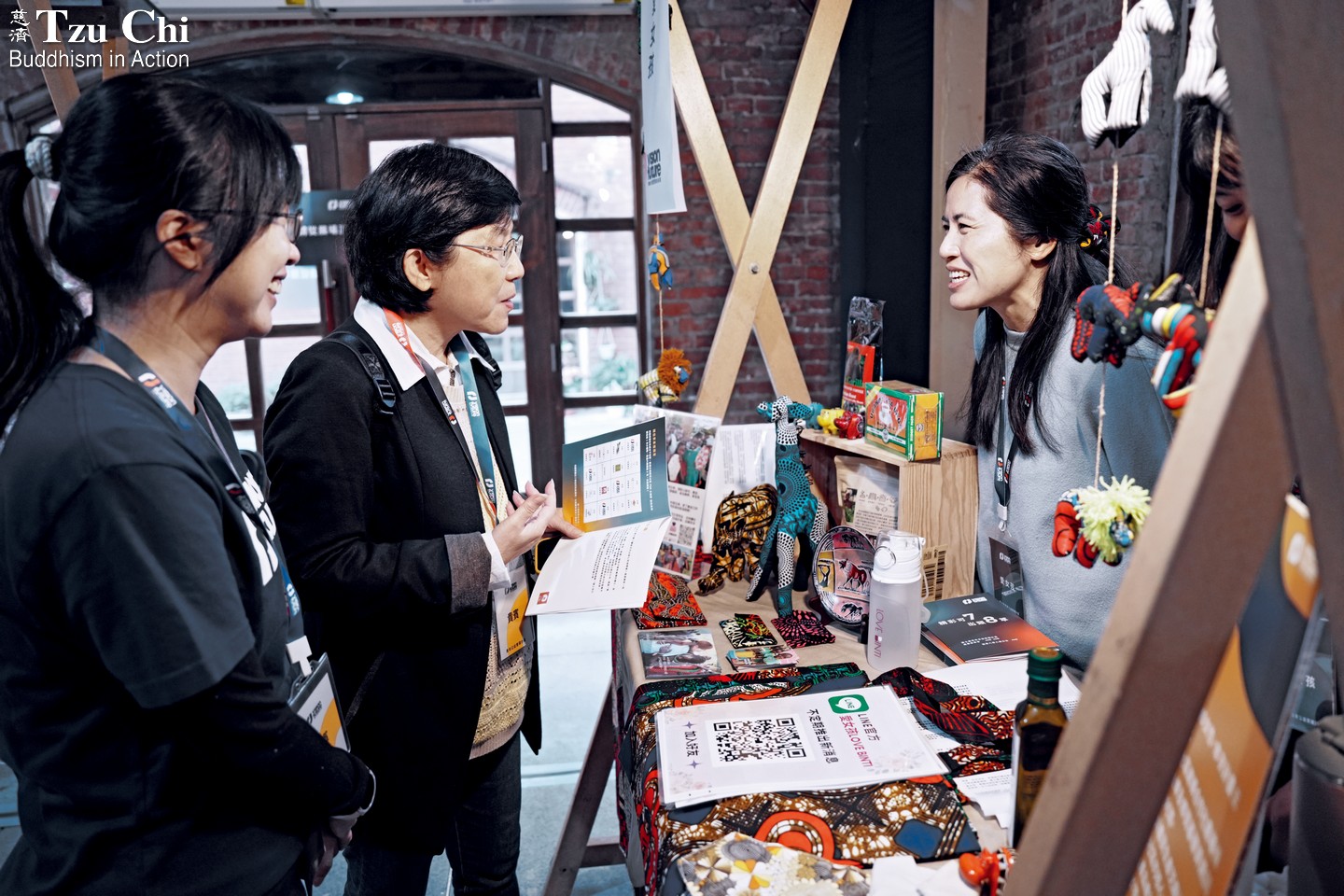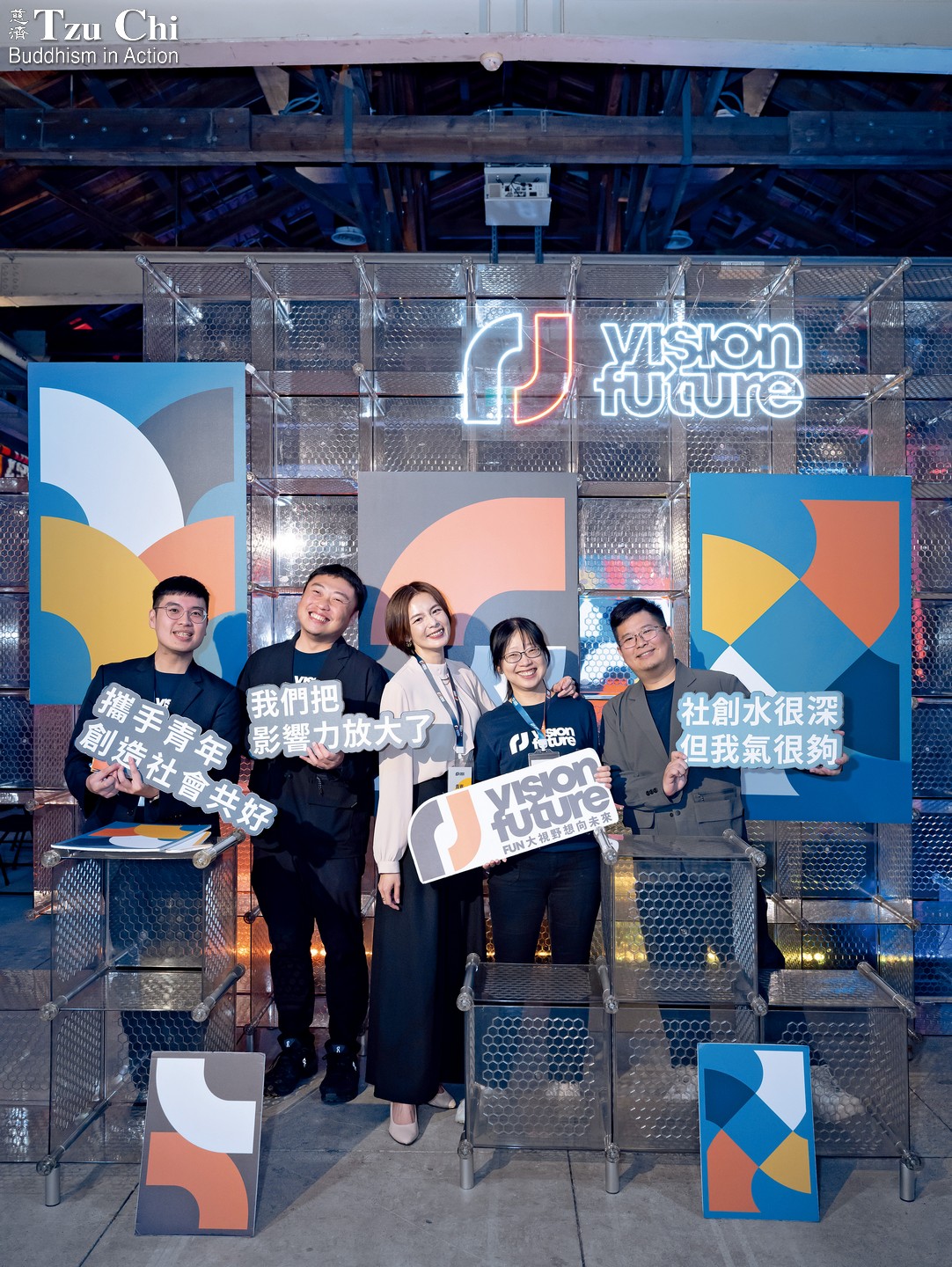By Yeh Tzu-hao
Edited and translated by Wu Hsiao-ting
Photos by Wu Meng-en
Tzu Chi’s Vision Future Incubator empowers young changemakers through funding and mentorship to drive positive change.

Team members, mentors, and Tzu Chi representatives pose together at the Vision Future Incubator’s seventh results presentation in December 2024.
Environmental pollution, climate change, and shifts in social dynamics have prompted many young people to reflect on how modern technology and sustainable thinking can be used to solve real-world problems. The launch of the United Nations’ 17 Sustainable Development Goals (SDGs) in 2016 gave this generation a clearer sense of direction and purpose to tackle such difficult challenges.
Recognizing the importance of socially driven, youth-led innovation, Tzu Chi introduced the Vision Future Incubator in 2017—a proposal-based competition designed to support young teams working for the public good through non-profit organizations or social enterprises. The program selects innovative, forward-thinking teams and provides funding, mentorship, and other resources to help them develop their initiatives and expand their impact.
The Vision Future Incubator is one of two key programs under Tzu Chi’s Youth Innovation Promotion initiative. The other is the Compassionate Technology Innovation Competition, which encourages students and teachers from high school through graduate school to design creative tools for use in charity and healthcare.
The driving force behind the Youth Innovation Promotion initiative was Professor Feng Yen (馮燕), a Tzu Chi board member and honorary professor of social work at National Taiwan University. After stepping down from public service in 2016, Feng joined Tzu Chi and proposed to Dharma Master Cheng Yen that the foundation share its resources with creative, socially minded youth outside the organization. “They may not fit within traditional institutional structures or conventional frameworks,” Feng said, “but they have the potential to forge entirely new paths. What they need are opportunities.”
As of its seventh year, the Vision Future Incubator has awarded grants to 77 teams. Yen Po-wen (顏博文), CEO of Tzu Chi’s charity mission, estimates that over 200 teams apply each year on average, competing for around ten grant awards. Unlike most competitions, where the process ends with a cash prize, the real work in this program begins after the award. As Tzu Chi liaison Tian Zhi-xian (田智賢) explained, “Through this program, Tzu Chi walks alongside young changemakers and supports them on a much longer journey to create lasting social impact.”
Building capacity
Take, for example, the 11 teams selected for the eighth Vision Future Incubator. Chosen in December 2024 through an open-call selection process, the teams began a yearlong capacity-building program in January 2025. Each team takes part in monthly workshops on topics such as business models, branding and marketing, and project management, with instructors providing guidance. They also receive eight to ten one-on-one mentoring sessions tailored to their specific fields. The program includes a midterm presentation in June and concludes with a final showcase in December.
The first monthly workshop took place the weekend before the Lunar New Year. On Saturday morning, the teams gathered at the Taipei NPO Hub on Chongqing South Road for an orientation. They then split into groups to visit three alumni teams that had previously taken part in the program: Against the Wind Theater, House of Story Wear, and the Red House Period Museum.
Against the Wind Theater is a troupe that addresses youth social issues through performance. “Fraud has become a very serious issue lately,” said director Cheng Wei-sheng (成瑋盛) to the visitors. “Last December, we invited a youth who had once worked as a scam courier and paired him with an elderly person who had been scammed. Together, they performed an intergenerational anti-fraud play.” He explained how the group uses theater and mentorship to help at-risk youth—such as school dropouts or those requiring close supervision—get their lives back on track.
To discourage unlicensed driving among teenagers, the troupe also formed the Against the Wind United motorbike team. Members must first obtain a driver’s license before joining. Every ride serves a public cause, whether cleaning up a beach or cooking for a banquet for seniors in remote areas. “We want them to do good in a way that speaks to them,” Cheng said.
In addition to learning from alumni, the new teams also gained insights into organizational management. On Sunday, at the Xindian Jing Si Hall in New Taipei City, business consultant Chen Xiu-han (陳秀涵) led participants in reflecting on the vision and mission behind their ventures and other foundational topics.
“The greatest overlap between social enterprises and non-profit organizations lies in their shared objective of creating social impact,” Chen said. “The main difference is how they’re funded—social enterprises rely on revenue, while non-profits depend on sponsorships or donations. No matter how they are funded, both require financial discipline, team coordination, and navigation of similar challenges and needs.”

Professor Feng Yen (second from left), a Tzu Chi board member and driving force behind the Vision Future Incubator, interacts with one of the selected teams during the seventh results presentation, encouraging the young entrepreneurs to unleash their creativity.
Building sustainable solutions
The 77 teams the Vision Future Incubator has supported through its yearlong capacity-building program work in areas such as environmental protection, circular economy, charitable innovation, and community development. About 60 percent of them operate as social enterprises. Their efforts directly contribute to the UN’s 17 SDGs, reflecting a shared commitment to environmental, social, and economic progress.
To support young changemakers like these, Tzu Chi partners with Impact Hub Taipei, a member of a global social innovation network. Olivier Chang (張士庭), co-founder of Impact Hub Taipei, pointed out that although Taiwan offers other startup support programs, most focus only on awarding prize money. “They often fall short when it comes to follow-up services and support,” he said. “Tzu Chi’s program stands out by helping teams build stronger, more stable foundations.”
Chang explained that their role involves assessing each team’s specific needs and helping them develop the skills necessary for sustainable operations. “For example, some teams struggle with donor communication. We match them with mentors who have that expertise—people who can walk them through the process, step by step, to revise their strategies.”
He also highlighted the importance of Tzu Chi’s four missions—charity, medicine, education, and culture—as practical resources for participating teams. “Sometimes, what a team lacks is simply a testing ground or collaborators,” Chang said. “If their work involves tutoring, for example, they can connect with Tzu Chi’s schools or volunteers from the Tzu Chi Teachers Association for assistance.” This network strengthens the overall impact of the program.
Chang emphasized that many young people are full of heart and ideas for making the world a better place. One inspiring example is Hearing AED, a team selected in 2023. It was founded by a public-spirited doctor who noticed that many cardiac arrest victims received no first aid before the ambulance arrived. To address this, he began training volunteers and developed a reporting system that alerts them when someone nearby collapses. These volunteers can quickly retrieve an AED—a portable device that delivers an electric shock to help restart the heart—and provide emergency care before official help arrives.
Other teams have tackled the issue of single-use tableware by designing rental systems that provide reusable dishes for events or takeout orders, offering a sustainable alternative that helps reduce waste and keep the environment cleaner.
Chang noted that if more people learn about and support such initiatives, many social issues could gradually improve. As the lead mentor for the Vision Future Incubator, he also reminds teams to cherish the funding they receive: “Some may assume that Tzu Chi’s funding comes from large corporations. But in reality, over 90 percent of donations are under a thousand New Taiwan dollars [US$33], contributed by everyday individuals. That prize money comes from countless small acts of generosity.”
He shared plans to enhance the program: “Many teams were new ventures when they participated in the program, but now they’re in their fifth or even seventh year of operation. As such, they may face more complex operational challenges, so we’re launching an alumni program that will include subsidies for consulting services.” The goal is to help them stay steady as they grow and continue contributing to public welfare and sustainability.
CEO Yen Po-wen warmly invited young people to join the Vision Future Incubator: “You can go fast alone, but with us, you can go far. The path of social innovation is not easy, but we’ll walk it with you—and help you find your footing.”

Olivier Chang (far right) has worked with Tzu Chi for over seven years to nurture and empower social-impact startups, giving the young entrepreneurs behind them a leg up. Ji Hua-xiu



